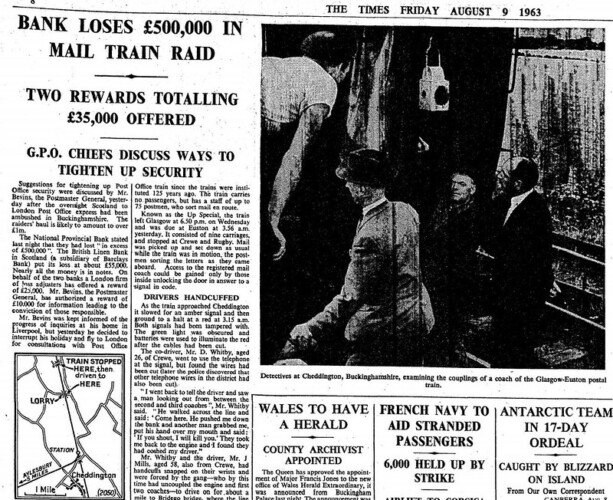1964: The great train robber escapes from jail
On August 12, 1964, a country-wide manhunt was under way after one of the so-called Great Train Robbers escaped from prison.
Battersea-born Charlie Wilson, 32, was freed by a gang of three men who broke into Winson Green Prison in Birmingham, in the early hours of the morning.
Officials believed the group stole a ladder from a nearby builders’ yard to break into the grounds of a psychiatric hospital next to the prison, and then used a rope ladder to scale the 20ft high prison wall.
They bludgeoned a patrolling warden on duty and tied him up before opening Wilson’s cell door and freeing him.
No-one knew how they got hold of the keys to Wilson’s cell. Winson Green is a maximum security prison, and only one member of staff holds the keys to open cells at night.
The escape left F. Castell, secretary of the Prison Officers’ Association, completely astounded.
“This is so abnormal that you just cannot cater for it”, he said at a news conference the following morning.

According to Wensley Clarkson’s 2006 book, Killing Charlie, Wilson turned to crime during his early life in Battersea, frequently stealing and using the money to buy shares in various gambling enterprises.
At the age of 31 he had built up a name for himself, considered as a “mastermind” behind one of the biggest heists of its kind: £2.3million stolen from a Royal Mail train in 1963 – a present-day value of around £30million.
Late on August 8, 1963, a Travelling Post Office train left Glasgow for Euston.
The second carriage from the front of the train was a High Value Package carriage, where registered mail was sorted.
The train passed Leighton Buzzard at about 3am. Moments later the driver, Jack Mills saw a red signal ahead at a place called Sears Crossing.
The signal was false. When Mr Mills stopped, his co-driver David Whitby climbed out of the diesel engine to ring the signalman.
The cables from the line-side phone had been cut, as he turned to return to the train he was attacked and thrown down the steep railway embankment.

Meanwhile, robbers broke into the train’s carriages and, forming a human chain, removed 120 sacks containing two-and-a-half-tons of money.
The gang consisted of 15 criminals, predominantly from South London.
Wilson’s role was the treasurer. He gave the robbers their cut of the haul: £150,000 each.
During the trial at Aylesbury Assizes, in April 1964, Wilson was given the nickname “the silent man” as he refused to say anything at all.
Two weeks after he was arrested for the robbery, he reportedly told police: “I don’t see how you can make it stick without the poppy (money), and you won’t find that.”
He served just four months of his 30-year jail sentence before his escape.

At the time of his escape, Wilson was believed to be the one robber who knew where the missing cash was hidden.
He went on the run for four years, until he was re-captured in Canada and returned to jail in the UK, where he served out the rest of his sentence.
After his release he moved to the Costa del Sol in Spain, and is alleged to have become involved in drug dealing.
He was shot dead by a hitman in his swimming pool on April 23, 1990.
Wilson is buried in Streatham Cemetery, in Garratt Lane, Tooting.
The police arrested and jailed 13 of the 15 members of the gang who carried out the Great Train Robbery. The lost money has never been recovered.
Pictured top: Charles Wilson, sentenced to 30 years imprisonment for his part in the £2.3million pound Great Train Robbery, leaving Aylesbury court in Buckinghamshire (Picture: PA)



